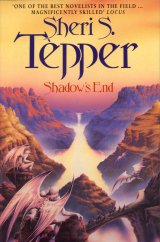Shadow's End
Sheri S. Tepper
After the disappointment of Beauty I approached Tepper's new
novel, Shadow's End with some caution, and was rewarded with a
considerably better book. Where Beauty was rather dull fantasy,
Shadow's End is science fiction with a fantastic touch; a novel about women in shadow, of aliens, humanity and their meeting in a remote
sector of a galaxy in peril.
 Shadow's End is predominantly the story of three women: Saluez, a
young woman of an isolated and isolationist planet; Snark, a young
criminal with a lost past; and Lutha, a woman ravaged by the worry
of a severely disabled son, Leely. Much of the novel is narrated by
Saluez as she meets first Lutha and later Snark and, through her
experiences, begins to realise the truth about the planet she lives on
and the gods she worships.
Shadow's End is predominantly the story of three women: Saluez, a
young woman of an isolated and isolationist planet; Snark, a young
criminal with a lost past; and Lutha, a woman ravaged by the worry
of a severely disabled son, Leely. Much of the novel is narrated by
Saluez as she meets first Lutha and later Snark and, through her
experiences, begins to realise the truth about the planet she lives on
and the gods she worships.
Tepper speculates that at the time of Shadow's End, the galaxy is
dominated by mankind: dominated utterly, so that planets that want
to colonise others are only allowed to do so after their own planet is
'homo-normed': all animal life that is not directly of use to man is
destroyed, only their patterns kept on computer. 'Firstism,'
the belief that the universe is made for man, is the prime belief
system. Fecundity is encouraged and women's prime role is as
mothers. While this setting is not entirely convincing it is an extreme
conclusion to a course that Earth already seems set on, that Firstism is
only a logical end to the casual disregard for the environment that
governments on Earth still show. In effect, Shadow's End is an
allegory, a cautionary tale, before it becomes too late.
For in Shadow's End, mankind is threatened by the mysterious
Ularians: no-one has ever seen them or lived to report, except one:
who went to ground and died on the planet Dinadh. Dinadh: whose
people weren't affected by the Ularians; who resisted Firstism and
homo-norming; whose closed culture was a mystery to outsiders.
Dinadh: home to Saluez the songfathers, and the 'beautiful ones',
where Lutha Tallstaff is sent with her son to try and discover the
secret of the Ularians, to save mankind. But the events on Dinadh,
Lutha's meeting with Saluez, make both women realise terrible
truths: about their children, about the 'beautiful people', about their
faiths and man's inhumanity to woman, so that when the action
shifts to the frontier planet of Perdur Alas and they finally encounter
the 'Ularians', they have to decide whether mankind is worth saving
after all.
The end itself is a little disappointing, as it is here that the allegorical
side to this novel is most evident and it all seems a little overblown
and just a little silly. Much of the rest of the novel, however, is
beautifully written. The characterisation is surprisingly good,
especially of Saluez and Lutha, and the others are written with
sympathy and flair. Dinadh is stunningly described and, unlike
Cherryh (see Review of Foreigner, p?), Tepper's aliens - the
'beautiful people' and the Ularians - do seem alien and it is horror
that I realised their true nature.
Shadow's End might not be everyone's cup of tea. I can imagine
that some readers will not be comfortable with either the allegorical
feel or Tepper's brand of feminism. Nevertheless, it kept me rapt and, though
flawed, is a fine example of science fiction with a message.
Home |
SF |
RPG |
Academics |
Links |
Contact
 Shadow's End is predominantly the story of three women: Saluez, a
young woman of an isolated and isolationist planet; Snark, a young
criminal with a lost past; and Lutha, a woman ravaged by the worry
of a severely disabled son, Leely. Much of the novel is narrated by
Saluez as she meets first Lutha and later Snark and, through her
experiences, begins to realise the truth about the planet she lives on
and the gods she worships.
Shadow's End is predominantly the story of three women: Saluez, a
young woman of an isolated and isolationist planet; Snark, a young
criminal with a lost past; and Lutha, a woman ravaged by the worry
of a severely disabled son, Leely. Much of the novel is narrated by
Saluez as she meets first Lutha and later Snark and, through her
experiences, begins to realise the truth about the planet she lives on
and the gods she worships.